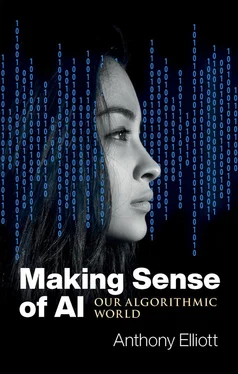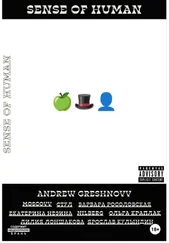If you accept the argument that AI involves the transformation of manufacturing and services between and across the world’s advanced economies and societies, then it follows logically that there will also be a wholesale shift at the base of the job skills pyramid, with very broad employment implications as well as the prospects of massive unemployment. As AI reorganizes the global economy, so transformationalists argue, blue- and white-collar jobs alike increasingly evaporate. The transformationalist story of what this will do to jobs and the future of employment is, however, multilayered and complex. For some transformationalists, the economic consequences of increasing automation are clear: the proportion of the labour force in manufacturing will decline sharply in all the industrialized countries. Martin Ford, in The Rise of the Robots , equates AI and automated technology directly with the threat of jobless futures. From telepresence robots to the digital offshoring of high-skill jobs, Ford sees a relentless AI-driven technology trend towards rising unemployment and greater inequality. 8Seeking to shift the debate beyond the conventional solution that increased education and training will facilitate better adaptation by workers into new, higher-skill roles, Ford argues the case for a new economic paradigm, one based on a guaranteed income or living wage that incentivizes risk-taking and entrepreneurship. Similarly, Richard Baldwin’s The Globotics Upheaval views the disruptive impacts of digital technology as wall-to-wall, resulting in an unparalleled displacement of jobs worldwide. In Baldwin’s telling of the transformationalist narrative, however, these negative impacts will be mostly short-lived, opening the way for a more optimistic prognosis of automated technology in the long run. As Baldwin comments:
I view AI . . . as a good thing once we can get through the transition. People’s jobs will be more interesting because all the robotic repetitive stuff will be done by machines. Things that can be done remotely will be done remotely and that will allow us to do things where we actually have to be together. So, ultimately, I think it will be a very, very good thing. 9
An excessive zeal also applies to other aspects of the transformationalist position, especially as regards the creation of new jobs. Transformationalists contend that automated production destroys jobs within industrial manufacturing. But, within this literature, there is also the argument that AI is creating new jobs elsewhere in the economy. An extraordinary range of knock-on services and jobs, especially roles performed as ‘digital work’, has been unleashed by the rise of AI – which, in turn, has led to the emergence of new industries, businesses and even occupations. As Paul R. Daugherty and H. James Wilson argue in Human + Machine: Reimagining Work in the Age of AI : ‘In the current era of business process improvement AI systems are not replacing us; they are amplifying our skills and collaborating with us to achieve performance gains that have previously not been possible.’ 10In today’s circumstances, argue some transformationalists, the future of jobs increasingly depends on AI–human collaboration. In this view, the deployment of human–machine hybrid teams dramatically improves productivity and thereby increases prosperity. Other transformationalists highlight that AI and machine learning algorithms (based on big data) underpin the scaling up of many companies across multiple industries today. Such developments drive new customer acquisition, underpin employee retention rates and help create new job opportunities.
Let us turn now to contrast two transformationalist interventions which centre upon the problem of work and employment. The first is Klaus Schwab’s The Fourth Industrial Revolution , issued by the World Economic Forum (of which Schwab is executive chairman). The second is Bernard Stiegler’s Automatic Society , volume 1 of which is subtitled The Future of Work . There is a telling feature about the writing of Klaus Schwab that several critics have noted, and which pertains to the underlying ardour of his transformationalist stance. Schwab makes it abundantly clear that the AI transformation in manufacturing and services is already well under way. The digital revolution, he contends, is producing ‘exponential disruptive change’, and this can be discerned in the prevalence of advanced robotics, machine learning, big data and supercomputers in business and organizational life today. The scope and scale of the digital revolution for Schwab – what he terms the ‘fourth industrial revolution’ – are ‘unlike anything humankind has experienced before’. 11Yet if Schwab’s transformationalism is clearly evident in this diagnosis of our times, his critique of the consequences of AI appears (at least on an initial reading) as scrupulously non-judgemental. Employment is a signal example. Schwab contends that AI ushers in massive efficiency gains and cost reductions for businesses and industry, but also highlights the massive automation of jobs stemming from these very developments. On the one hand, he emphasizes that technological innovation today destroys jobs as never before, whilst on the other hand he underscores that AI unleashes a new era of prosperity through the creation of novel employment opportunities and future industries. He argues that AI disrupts labour markets and workplaces around the world, and yet emphasizes the ability of workers in the new economy to adapt continuously and fashion new skills through lifelong learning.
In other words, Schwab’s approach seeks to capture both the stunning opportunities and threatening risks stemming from AI. Pressed to an extreme, however, his analytic approach is never free from a certain degree of ambivalence, as every social change associated with the digital revolution appears mediated through this both/and logic. This might be said to be the conceptual equivalent of wanting to have your cake and eat it too. Towards the latter sections of The Fourth Industrial Revolution , Schwab’s analytic reserve – where his lack of a conclusion on the consequences of AI becomes a conclusion all of its own – gives way to a more robust transformationalist sensibility. As he concludes:
The digital mindset, capable of institutionalizing cross-functional collaboration, flattening hierarchies, and building environments that encourage a generation of new ideas, is profoundly dependent on emotional intelligence . . . The world is fast changing, hyper-connected, even more complex and becoming more fragmented but we can still shape our future in a way that benefits all. The window of opportunity for doing so is now. 12
In the end, AI for Schwab is an exhilaratingly progressive affair. He argues that AI has the potential to be institutionalized as a global, cosmopolitan form of life, one to be celebrated rather than castigated.
In contrast to this business-school approach to understanding AI, radical French theory informs Bernard Stiegler’s Automatic Society . Like Schwab, Stiegler holds that the AI revolution is already upon us. AI for Stiegler inaugurates a new social order of ‘total autonomization’, in which production and manufacturing are controlled by software and big data. But unlike Schwab with his stab at analytic even-handedness, Stiegler is out to develop a more full-blooded critique of the destructive aspects of AI for economy and society. He writes, for example, of today’s ‘immense transformation’ whereby ‘capitalism becomes purely computational ’, of ‘generalized autonomization and autonomisms’, and of ‘algorithmic governmentality’. Taking his cue from the post-structuralist analysis of ‘control societies’ developed by Gilles Deleuze, Stiegler seeks to lay bare the short-circuiting of minds and spirits – the ‘shock and stupefaction’ inflicted on contemporary women and men – arising from full automatization. Drawing upon quantum physics, Stiegler argues that automatized societies are increasingly locked in a contradictory relationship between entropy (where life-energy dissipates) and negative entropy (the reversal, or undoing, of such decomposition). ‘Automation’, writes Stiegler, ‘has given rise to an immense amount of entropy, on such a scale that today, throughout the entire world, humanity fundamentally doubts its future – and in young people especially so.’ 13Google Translate, as Stiegler remarks, is a good example of the immense linguistic entropy occurring throughout the world today, as split-second machine translation of the world’s diverse languages into English results in a radical impoverishment of vocabulary. Google’s algorithms simply flatten both the individual and collective use of language. What is at stake, as Stiegler shrewdly points out, is human knowledge in the broadest sense; knowing how to think, reflect, talk, communicate and act in the world.
Читать дальше

![Джейн Остин - Sense and Sensibility [С англо-русским словарем]](/books/26612/dzhejn-ostin-sense-and-sensibility-s-anglo-thumb.webp)










